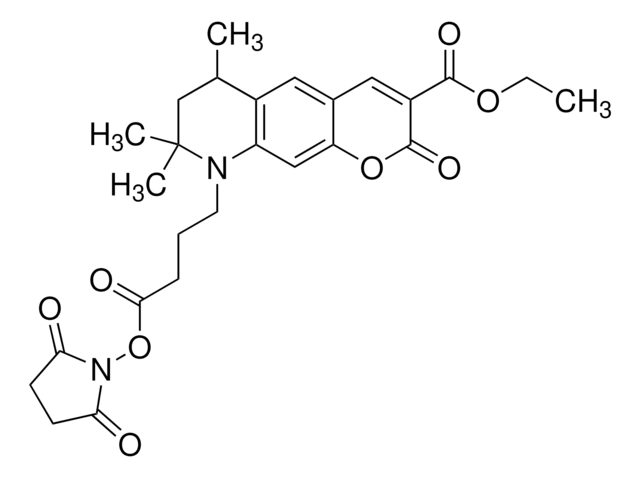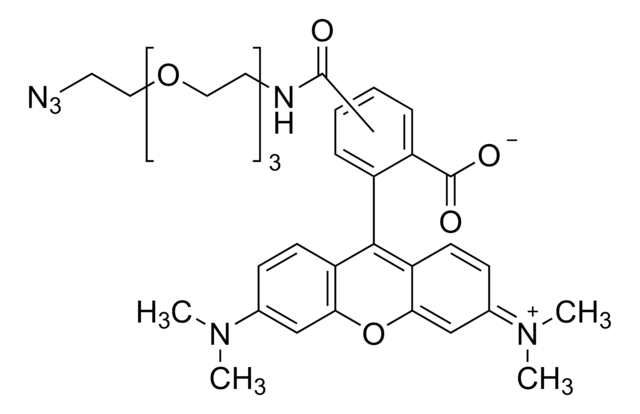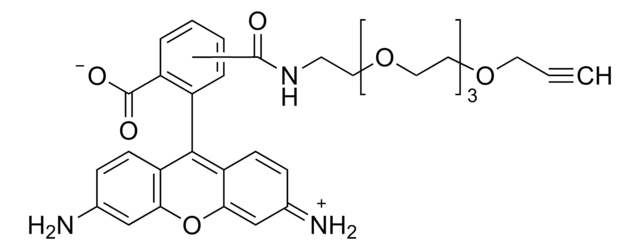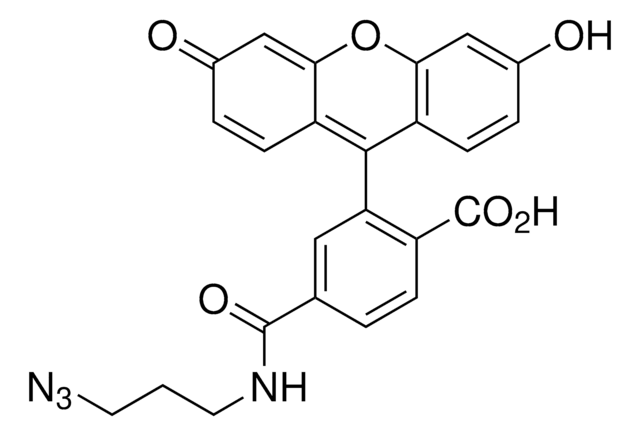41986
Atto 550 azide
BioReagent, suitable for fluorescence
Zaloguj sięWyświetlanie cen organizacyjnych i kontraktowych
About This Item
Kod UNSPSC:
12352125
NACRES:
NA.32
Polecane produkty
linia produktu
BioReagent
Próba
>90% (HPLC)
producent / nazwa handlowa
ATTO-TEC GmbH
przepuszczalność
254 nm
550 nm
fluorescencja
λex 554 nm; λem 576 nm±10 nm in 0.1 M phosphate pH 7.0
λ
(ethanol with 0.1% trifluoroacetic acid)
absorpcja UV
λ: 553-559 nm Amax
przydatność
suitable for fluorescence
temp. przechowywania
−20°C
Informacje prawne
This product is for Research use only. In case of intended commercialization, please contact the IP-holder (ATTO-TEC GmbH, Germany) for licensing.
This page may contain text that has been machine translated.
Kod klasy składowania
11 - Combustible Solids
Klasa zagrożenia wodnego (WGK)
WGK 3
Temperatura zapłonu (°F)
Not applicable
Temperatura zapłonu (°C)
Not applicable
Certyfikaty analizy (CoA)
Poszukaj Certyfikaty analizy (CoA), wpisując numer partii/serii produktów. Numery serii i partii można znaleźć na etykiecie produktu po słowach „seria” lub „partia”.
Masz już ten produkt?
Dokumenty związane z niedawno zakupionymi produktami zostały zamieszczone w Bibliotece dokumentów.
Smart-aggregation imaging for single molecule localization with SPAD cameras.
Gyongy, I.; et al.
arXiv (2016)
Robert H Meltzer et al.
Lab on a chip, 11(5), 863-873 (2011-01-21)
Rapid, specific, and sensitive detection of airborne bacteria, viruses, and toxins is critical for biodefense, yet the diverse nature of the threats poses a challenge for integrated surveillance, as each class of pathogens typically requires different detection strategies. Here, we
A molecular toolkit for population genetic investigations of the ash dieback pathogen Hymenoscyphus pseudoalbidus.
Gross, A., et al.
Forest Pathology, 42, 252-264 (2012)
Rahul Roy et al.
Nature methods, 5(6), 507-516 (2008-05-31)
Single-molecule fluorescence resonance energy transfer (smFRET) is one of the most general and adaptable single-molecule techniques. Despite the explosive growth in the application of smFRET to answer biological questions in the last decade, the technique has been practiced mostly by
Eric J White et al.
Clinical chemistry, 55(12), 2121-2129 (2009-10-10)
Epidemiologic studies require identification or typing of microbial strains. Macrorestriction DNA mapping analyzed by pulsed-field gel electrophoresis (PFGE) is considered the current gold standard of genomic typing. This technique, however, is difficult to implement because it is labor-intensive and difficult
Nasz zespół naukowców ma doświadczenie we wszystkich obszarach badań, w tym w naukach przyrodniczych, materiałoznawstwie, syntezie chemicznej, chromatografii, analityce i wielu innych dziedzinach.
Skontaktuj się z zespołem ds. pomocy technicznej




